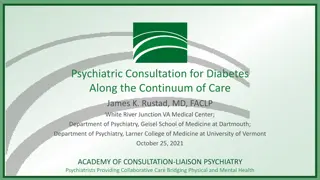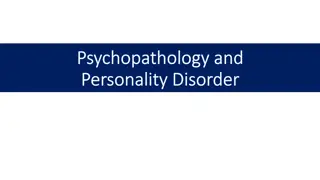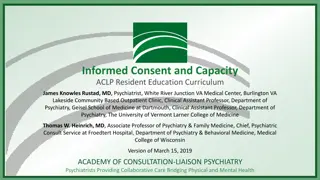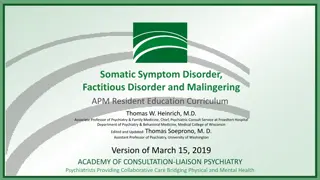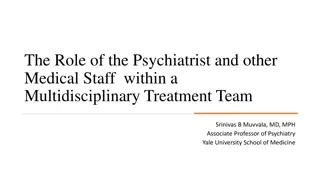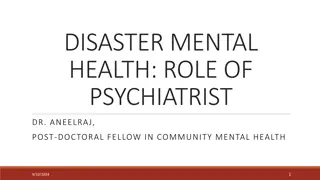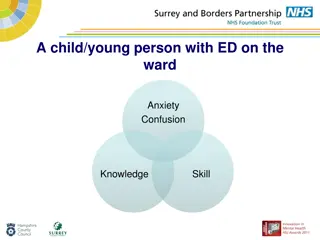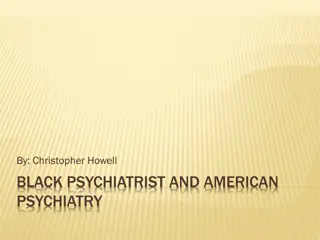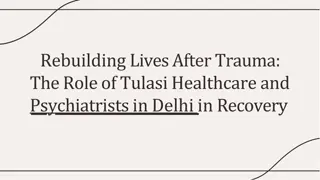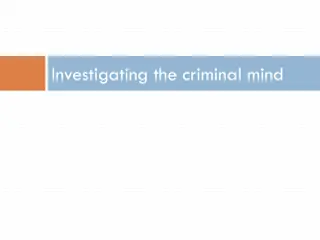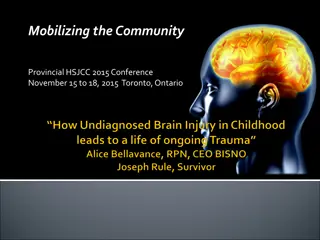Navigating the ACLP Annual Meeting: Tips & Tricks
Learn how to efficiently navigate the ACLP Annual Meeting with tips on registration, dress code, meeting information, and reasons to attend for medical students, residents, fellows, and practicing psychiatrists. Explore mentorship opportunities, educational subcommittees, and valuable networking ses
2 views • 46 slides
Psychiatric Consultation for Diabetes: Enhancing Care at the Intersection of Mental and Physical Health
This presentation by Dr. James K. Rustad explores the critical role of consultation-liaison psychiatrists in managing diabetes along with mental health conditions like schizophrenia. It delves into the prevalence of diabetes, particularly among specific demographic groups, and highlights the complex
0 views • 35 slides
Understanding Psychopathology and Diagnostic Systems in Mental Health
Psychopathology encompasses the study of mental illness and distress, with psychiatrists and clinical psychologists deeply involved in diagnosis and treatment. Signs of psychopathology can include mood changes, excessive worry, and withdrawal from activities. Diagnostic systems like DSM-5, ICD-11, a
0 views • 22 slides
Introduction to Forensic Psychology and its Intersection with Law
Forensic psychology and psychiatry involve applying psychological principles to legal matters, including competency evaluations and crime scene reconstruction. Forensic psychiatrists, with medical training, assess suspects, victims, and witnesses, while forensic psychologists, with expertise in psyc
1 views • 8 slides
Understanding Informed Consent and Capacity in Psychiatry
Exploring the process of obtaining informed consent, defining competence and capacity, assessing decision-making abilities, and examining substitute decision-makers in medical settings. The presentation touches on key points in determining a patient's capacity for treatment decisions, with case scen
0 views • 38 slides
Understanding Somatic Symptom Disorder and Related Disorders
This educational material delves into Somatic Symptom Disorder, Factitious Disorder, and Malingering, emphasizing the importance of accurate diagnosis and management. It explores various aspects, including symptoms, classifications, and implications in bridging physical and mental health. The conten
0 views • 91 slides
Community Learning Disability Team in Waltham Forest - Support Services for Well-being
This Easy Read leaflet introduces the Community Learning Disability Team (CLDT) in Waltham Forest, an integrated team run by the council and NHS. The CLDT offers support services to help individuals live safely, be independent, make important choices, and understand information easily. Services incl
0 views • 7 slides
The Role of Psychiatrists in Co-occurring Disorders Treatment
Psychiatrists play a crucial role in treating co-occurring substance use disorders alongside other medical staff in a multidisciplinary team. Integrating mental health and addiction treatment is essential, as only a small percentage of individuals with addiction receive care. Factors promoting optim
0 views • 23 slides
Understanding the Role of Psychiatrists in Disaster Mental Health
Disaster mental health involves applying psychiatric skills to aid individuals and communities in recovering from the psychological effects of disasters. This includes readiness, response, relief, rehabilitation, recovery, and resilience phases. Mental health professionals play a crucial role in ide
0 views • 30 slides
Innovative Crisis Stabilization Center in Charleston: Transforming Mental Health Care
The Tri-County Crisis Stabilization Center (TCSC) in Charleston offers round-the-clock services for individuals in psychiatric distress. With a focus on diversion from emergency departments, hospitals, and jails, the center provides comprehensive care by a team of skilled clinicians, nurses, and psy
0 views • 12 slides
Comprehensive Management Guidelines for Pediatric Eating Disorders
This comprehensive guide covers the management of children and young persons with eating disorders, focusing on anxiety, confusion, knowledge, and skill development. It emphasizes the partnership between pediatricians and psychiatrists, specific medical and nutritional aspects, adequate support, and
0 views • 29 slides
Pioneering Black Psychiatrists in American History
Solomon Carter Fuller, Raphael Hernandez, Dr. Ernest Y. Williams, and Charles Prudhomme were trailblazing Black psychiatrists who made significant contributions to the field of psychiatry in the United States. From Fuller's groundbreaking research in Alzheimer's Disease to Hernandez's leadership rol
0 views • 16 slides
rebuildinglives-after-trauma-the-role-of-tulasi-healthcare-and-psychiatrists-in-delhi-in-recovery
Trauma can deeply affect an individual\u2019s mental, emotional, and physical well-being, often leading to long-term mental health challenges. Tulasi Healthcare recognizes the profound impact of trauma and offers specialized recovery programs that he
0 views • 6 slides
Unraveling the Criminal Mind: A Look Into Forensic Psychiatry
Delve into the realm of forensic psychiatry where examining physical evidence helps uncover the who, what, and how of crimes, while forensic psychiatrists focus on determining the why. Contrasting clinical and forensic psychiatry, the role of forensic psychiatrists involves assessing various aspects
0 views • 13 slides
Personal Journey Through Adversity: A Story of Resilience and Recovery
This narrative follows a person's life journey marked by various traumatic incidents like head injuries, criminal activities, and mental health struggles. Despite facing challenges, the individual sought help, received treatment, and worked towards recovery with support from organizations like BISNO
0 views • 11 slides
Professionals' Attitudes Towards Smokers with Mental Health Conditions and Smoke-free Policy
Lucy Furby, a Public Health Registrar, conducted research on staff attitudes towards smokers with mental health conditions and the implementation of smoke-free policies. The study, carried out from November 2019 to February 2020, focused on psychiatrists and mental health nurses. Findings revealed b
0 views • 19 slides

